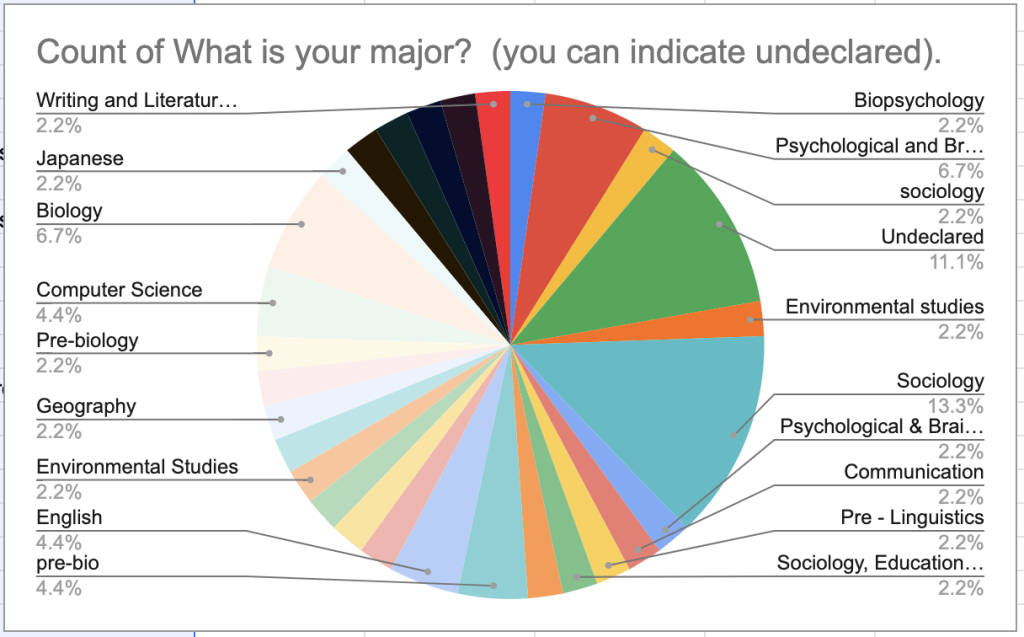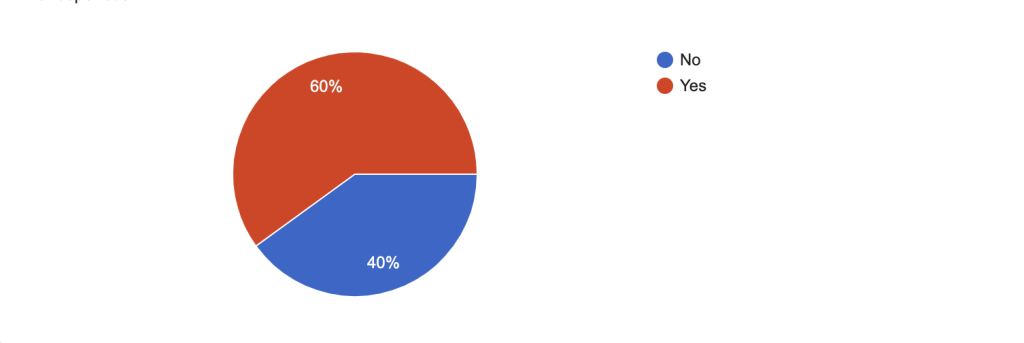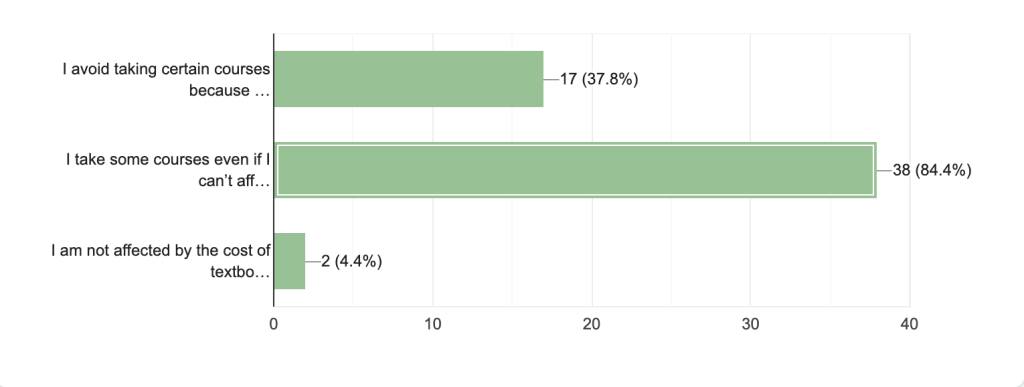The University of California, Santa Barbara (UCSB) Open Educational Resource (OER) environmental scan entailed the Affordable Resources for Learning survey for students in the UCSB Promise Scholars Program. The UCSB Promise Scholars Program is designed to empower high achieving first generation students from low-income backgrounds. It was vital to hear the students’ voices on the challenges they face acquiring learning resources like textbooks. Thus, the survey was designed to assess some of the challenges that students in this program face, especially those surrounding textbook acquisition. The other goals of the survey was to determine if the students are aware of alternative resources like OER, if they would consider advocating for OER once they know more about them, and ways they might advocate for alternative learning resources like OER.
The survey had 9 questions and 45 students responded. The responses to the survey are located here. The questions are listed below:
- What is your major? (you can indicate undeclared).
- Does the cost of textbooks influence the number of units you take each quarter?
- Check any that apply below:
- I avoid taking certain courses because of the cost of textbooks
- I take some courses even if I can’t afford the assigned textbooks. I rely on friends, Library Course Reserves or the internet instead.
- I am not affected by the cost of textbooks
- Approximately how much did you spend on textbooks last quarter?
- Has the COVID-19 pandemic affected your access to assigned textbooks? If so, in what ways?
- How familiar are you with OERs? Reminder: OERs are freely and openly available. They include textbooks, lecture notes, tests, assignments, and more.
- How would using Open Educational Resources benefit you?
- If you feel that OERs might benefit you, how might you advocate for their use at UCSB?
- The library is interested in pursuing more OER adoption at UCSB. Please share your thoughts about the library’s role and any other comments you might have.
It was vital to get an understanding of the student respondents’ majors to see which departments they are affiliated with and whether the departments fall under the high enrollment category. Four of the respondents are majoring in departments with high enrollment courses: Communication, English, Environmental Studies, Psychology, and Sociology.
The piechart below shows the students’ major, some had yet declare their major.

Sixty percent of the student respondents highlighted that the cost of textbooks influenced the number of units they take each quarter. Only 40% of the survey takers said textbook cost did not factor into the number of units they take. One is left wondering if students get the most out of their education when textbook cost prevents them from taking certain courses.
Pie chart on the influence of textbook cost on the number of units taken.

The student survey respondents also shared the various ways in which textbook cost impacted them, as highlighted below.

Of the students who responded to the survey, 37.8% stated that they avoided taking certain courses because of the cost of textbooks. Eighty percent of the respondents said they took some courses even if they can not afford the assigned textbooks and rely on friends, Library Course Reserves or the internet for resources. Only 4% of the students said they were not affected by the cost of textbooks. Having 37.8% of the respondents reporting that they avoided certain courses due to textbook cost shows detriment to student learning. Thus, there is great need to look at affordable learning resources options for students. Students were also asked to give an approximate figure of how much they spent on textbooks in fall 2020. About 96% of the respondents said they spent $500 or less, 2% said they spend $500 to $1000, and 2% spend $1000 or more. According to BCampus, as cited by SPARC, “In the United States, 31 percent of students have not registered for a course they’re interested in because of the textbook cost (BCcampus, 2014).” That’s a loss for society as well as for that individual.” The response also makes one wonder if 96% of the students are simply doing without their required readings since they spent $500 or less for the fall quarter, 2020.
Another question asked was if the COVID-19 pandemic affected the students’ access to assigned textbooks, and if so, in what ways. Only 8 respondents indicated that COVID-19 had not affected their access to assigned textbooks. For this question, it is crucial to share the quotes directly from the students so as to amplify their voices:
- “I always scramble to find pdfs or free resources”
- “Yes, sometimes I am unable to do assigned readings because I have not gotten my books yet”
- “I am not able to use the books at the library”
- “Many of my books must be downloaded which does make it a bit more difficult to read from a screen”
- “Yes, because it delays shipments of my textbooks and restricts access to library/campus resources”
- “Because I can’t work as much, I have to limit my spending so I can make sure that I have enough money to cover the cost of my textbooks. I also make sure to buy rentals, instead of a new book since I don’t have that luxury to do so.”
- “Yes. I’ve had to drop a couple courses because I couldn’t afford to buy the textbook. When school was in person, I was able to rent physical books from the book store, but I can’t do that anymore.”
- “It has made it harder for me to get used books from other students. I have to rely more on Amazon Prime or other online alternatives.”
- “More classes require more reading”
- “Yes, some assigned textbooks tend to be really expensive and it can be overwhelming if that’s the case for multiple classes. Access to affordable textbooks has become more of a challenge because we’re not on campus and don’t have immediate access to these necessary materials at a reasonable price or even for free”
- “I have had more access to textbooks than before since my professors upload the readings directly or do not require a purchase”
- “Some books have been very difficult to find because the Campus Store is not open and if I find them online, they are way more expensive than the ones from the Campus Store”
- “So far it hasn’t affected my access to assigned textbooks yet”
- “Having to wait for them to ship”
- “I feel like the pandemic might have hit most students financially so I had it to make sure to check how much my textbooks cost and if I could find any cheaper alternatives before really going through with a class”
- “I feel that my textbook cost has been universally the same as before COVID-19”
- “Most books are eBooks and its harder for me to focus”
- “I am not able to use the course reserves anymore”
- “Yes by limiting access to resources like the library”
- “Yes, the pandemic has affected my access to assigned textbooks because I feel like I am less aware of resources that may assist me cover the cost of textbooks”
- “I have had no affect”
- “The pandemic inhibits me from buying the book directly from the campus store so I have to pay extra for shipping Apart from this time also seems to be an issue when waiting for my assigned textbooks to arrive”
- “I’ve been focused on more either library sources or Chegg”
- “Having the book at the library to check out during designated times allowed me to use it when needed”
- “I have to look online for free PDFs Instead”
- “None, so far. However, some of my teachers post our textbook assignments on our GauchoSpace and that has helped out a lot! Hopefully all teachers do that”
- “Yes, my professors have tried to use textbooks that we can buy at a cheaper price, which has been helpful”
- “Yes. I have no access to the physical library and some textbooks are impossible to find unless you spend a ton of money on them”
- “Yes, I believe the COVID-19 pandemic has made some professors give more free access to the assigned texts required for their courses”
- “I have to buy them from the online library and it is a confusing process and they take a while to deliver”
- “It’s made it harder to find textbooks and get them sent to me in a timely manner. I’ve had to rely on online texts and pdf documents”
- “Shipping books is more expensive on a shorter tine frame”
- “I feel like it has with the price of the assigned textbooks, with everything going on they are expensive and could make it harder for us low income students”
- “Yes, I can’t go to the library to check out books, I have to purchase them and purchase a lot of ink to print out and read material”
- “Made it difficult to get cheaper books/ have to pay more for shipping”
- “Due to the financial toll of the pandemic, I can’t afford to take courses that require too many expensive books especially ones that require multiple textbooks/books and subscriptions to online learning systems”
- “Professors tend to give readings online for free, but I’ve had a couple of classes where I had no choice but to buy new books at retail price”
- “Shipping is often so expensive or so slow that the book doesn’t arrive until past the midterm so there’s no point buying it”
The responses above reveal some of the textbook acquisition challenges faced by the respondents. An overwhelming number of the respondents faced some textbook challenges during the COVID-19 pandemic. These include paying more money for book shipping costs, the pandemic induced financial toll impacting the number of textbooks a student can purchase, the cost of textbooks being too high, and books being hard to find with Campus Store closed, among other things. Moreover, some respondents shared that the lack of library Course Reserves posed a challenge for them to access learning resources. Thus, to some extent, COVID-19 made resource access challenging to some students in dire need of these materials in order to succeed in their programs.
However, some of the responses point to some of the professors making an effort to find affordable and accessible alternative resources for students and posting these electronic materials on the UCSB student Learning Management System called GauchoSpace. The responses by the students highlight a need to assess how faculty can tap into OER to help improve student access to learning resources.
